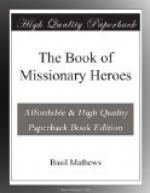He was the only one of those who were listening to Sabat who could understand what he was saying. When Sabat had finished his story, Martyn turned, and, in his clear, musical voice translated it from the Persian into Latin mixed with Italian for Padre Julius Caesar, into Hindustani for the Indian scholar, into Bengali for the Bengal gentleman, and into English for the British officer and his wife. Martyn could also talk to Sabat himself both in Arabic and in Persian.
As Martyn listened to the rolling sentences of Sabat, the Christian Arab, he seemed to see the lands beyond India, away across the Khyber Pass, where Sabat had travelled—Mesopotamia, Arabia, Persia.
Henry Martyn knew that in all those lands the people were Mohammedans. He wanted one thing above everything else in the world: that was to give them all the chance of doing what Sabat and Abdallah had done—the chance of reading in their own languages the one book in the world that could tell them that God was a Father—the book of letters and of biographies that we call the New Testament.
The Toil of Brain
There was not in the world a copy of the New Testament in good Persian. To make one Henry Martyn slaved hard, far into the hot, sultry Indian nights, with scores of mosquitoes “pinging” round his lamp and his head, grinding at his Persian grammar, so that he could translate the life of Jesus Christ into that language.
Even while he was listening to Sabat’s story in the bungalow at Cawnpore, Martyn knew that he was so ill that he could not live for many years more. The doctor said that he must leave India for a time to be in a healthier place. Should he go home to England, where all his friends were? He wanted that; but much more he wanted to go on with his work. So he asked the doctor if he might go to Persia on the way home, and he agreed.
So Martyn went down from Cawnpore to Calcutta, and in a boat down the Hoogli river to the little Arab coasting sailing ship the Hummoudi, which hoisted sail and started on its voyage round India to Bombay. Martyn read while on board the Old Testament in the original Hebrew and the New Testament in the original Greek, so that he might understand them better and make a more perfect translation into Persian. He read the Koran of Mohammed so that he could argue with the Persians about it. And he worked hard at Arabic grammar, and read books in Persian. Yet he was for ever cracking jokes with his fellow travellers, cooped up in the little ship on the hot tropical seas.
From Bombay the governor granted Martyn a passage up the Persian Gulf in the Benares, a ship in the Indian Navy that was going on a cruise to finish the exciting work of hunting down the fierce Arab pirates of the Persian Gulf. So on Lady Day, 1811, the sailors got her under weigh and tacked northward up the Gulf, till at last, on May 21, the roofs and minarets of Bushire hove in sight. Martyn, leaning over the bulwarks, could see the town jutting out into the Gulf on a spit of sand and the sea almost surrounding it. That day he set foot for the first time on the soil of Persia.




